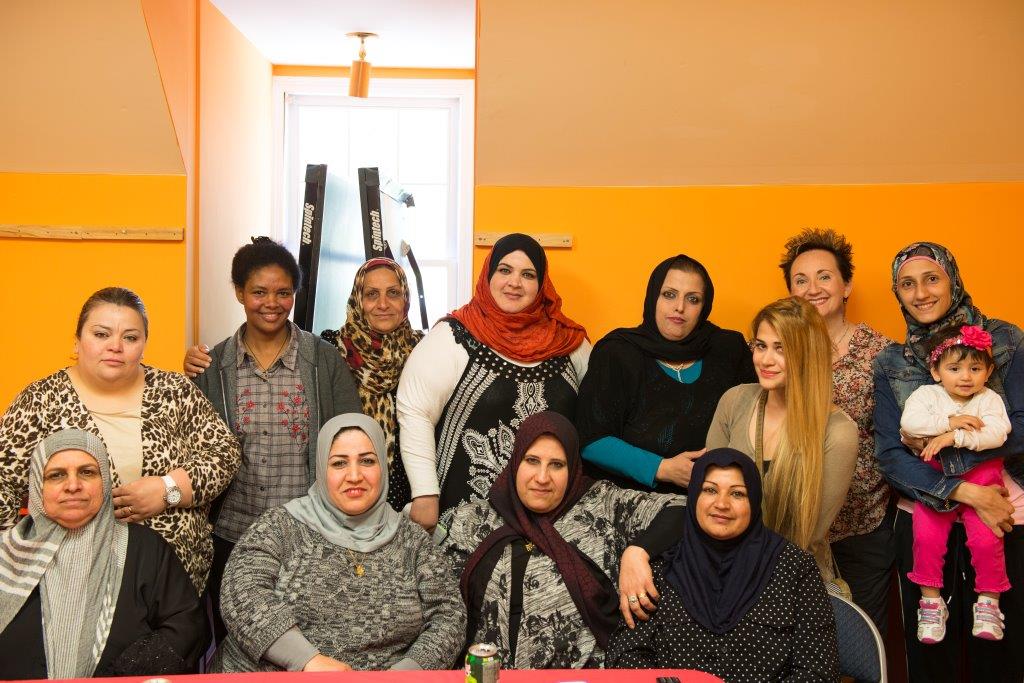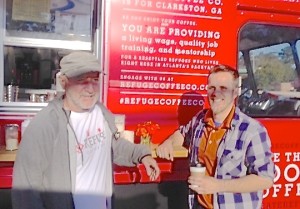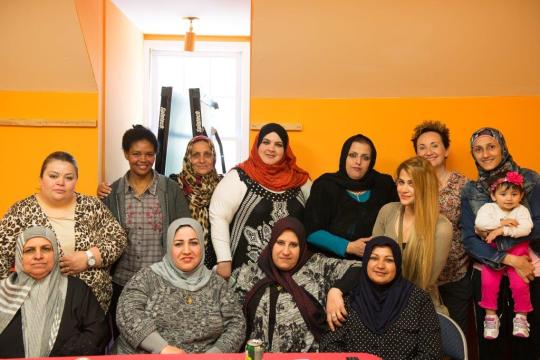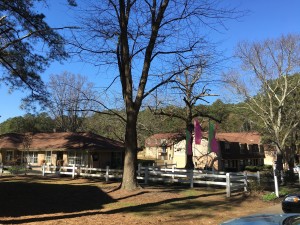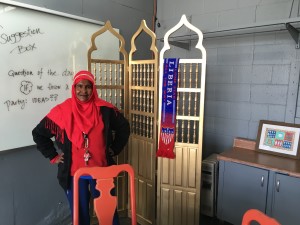Editor’s note: The main photo is courtesy of Michael Uhr, courtesy of the David J. Sencer CDC Museum
Clarkston Mayor Ted Terry says that while his city is ready for more newcomers, there’s no official word on who’s coming and who’s not — including refugees from Syria and many other countries.
The city has no say on who comes or when, he points out.
“But our job in Clarkston is to do our part and welcome those who arrive,” says Terry, citing an official process as mandated by an international treaty known as the 1980 Refugee Act.
Clarkston is at the center of small area in DeKalb County that has become a haven for refugees from many countries over the past three decades.
Like Clarkston, the United States in general has been extremely welcoming to refugees. But the issue of admitting more Syrians has sparked controversy recently because of some unusual factors.
A tragic situation
Civil war and the rise of the terror group Isis have devastated Syria, and millions of people are now refugees elsewhere because of the war.
The United States is admitting more Syrian refugees, but in the wake of the Paris terrorist attacks, Georgia Gov. Nathan Deal and some other governors tried to halt all new settlement from Syria. “In light of the terror attacks in Paris, I’ve issued an executive order directing state agency heads to prevent the resettlement of Syrian refugees in Georgia,” said Deal in a Nov. 16 press release.
And that was before a married couple professing loyalty to Isis staged a bloody terrorist attack this month in San Bernardino, Calif.
An estimated 60 to 100 Syrian refugees are already living in Georgia.
When asked about refugee health care, Terry says there are many Clarkston groups that have spent years reaching out to those refugees who are already in town. They include organizations such as New American Pathways, Lutheran Services of Georgia and World Relief.
Horrific conditions
Health care for refugees from any country is multifaceted. Many have lived under horrific conditions, and some have spent years in crowded camps.
The initial health screening for refugees ensures they are not carrying contagious diseases, such as tuberculosis (TB). These tests take place in the camps. Other health screenings may include immunization assessments, pediatric primary care, as well as outreach and home visits (if and when needed).
A number of organization representatives and Clarkston residents say refugees have plenty of needs.
After arriving here, refugees have specific screenings to “eliminate health-related barriers,” says Vickie Elisa, a spokeswoman for the DeKalb County Board of Health. That first exam takes place at the county’s Winn Way location.
“But that’s not nearly enough,” says Lorrie King, a longtime advocate for refugees. King is passionate about improving their health care — from their physical status to their growing need for positive mental health.
After people have fled their war-torn homelands, lived in camps and suffered the loss of family and friends, there’s much that can be done to help them, King says.
King, who is from Oregon and Jewish, has formed an alliance with colleague Noor Alzahawe, a Kurdish Muslim.
Unique partners in their health care interventions, they remain two leaders of Clarkston’s “Coffee Klatch” — a multiracial, nonsectarian group whose leaders are dedicated to all women’s health regardless of background.
The group formed when Noor suggested to King that female refugees should get together to just talk over coffee. Those who have been in the United States longer are often able to help the new arrivals.
Women have met over coffee for years, says King. “It’s one of those gatherings that’s considered universal.”
On the other hand, Ben Spivey, Star C’s executive director, sees another need that he and others are hoping to fill.
Star C’s mission is to improve workforce communities and residential apartment communities for refugees and immigrants.
The apartment building that Spivey works with is Willow Branch Apartments.
Spivey says Star-C is responsible for community development activities for residents who are primarily refugees and immigrants with an average household income of just over $16,000. There is a strong legal difference between the two groups, but many of their Willow Branch residents’ health needs are the same, says Spivey — whether they are refugees or immigrants.
In addition to educating residents about good health care, Willow Wellness program — located at the apartment complex — organizes access to health services at a nominal cost to its clients.
A variety of needs
“Residents will need a primary care physician,” says Spivey. Willow Wellness also helps residents gain an understanding of the local health care system.
Star-C also provides free educational programs around nutrition (e.g., supporting community gardens), personal hygiene and family planning, says Spivey.
For the refugees’ mental well-being, one idea taking hold seems to be the Refuge Coffee Company, the brainchild of Clarkston resident Kitti Murray. For now, it’s a coffee truck, but there are plans for a more permanent location.
This nonprofit business serves more than coffee to Clarkston’s global community twice a week. Its truck is a gathering spot for residents to find conversation and meet friends. At the same time, it offers jobs for some of the newest U.S. residents, who can learn the art of being a barista.
Many Americans may be worried about Syrians. But Terry says people in Clarkston have received many offers to house one of the Syrian families they’ve seen on the news.
Brian Street, a spokesman for the U.S. State Department, says relocation from the refugee camps can take 18 to 24 months.
King, who teaches a course on refugee health at Emory, says it can take even longer than that, with some remaining in camps for 4 to 8 years.
It took a long time for Amina (whose last name is not being used for her protection) to finally feel safe. She fled the chaos and violence of Somalia a little over six years ago. “There are many people here in Clarkston who are struggling,” she says, referring to the health issues of local residents.
Mental health care is very difficult to obtain for the refugees, she says. Amina’s friend from Iraq has suffered trauma and rape and still cannot get the mental health care that a woman needs, says Amina, who mentions many other tragic situations.
“But now we have a WellRefugee Center,” says Amina with pride. “Come,” says Amina. “You will like our doctor.”
The U.N. Refugee Agency announced that more than 4 million Syrians have become refugees since late last summer — fleeing war and persecution.
“The number of forcibly dislocated people in the world today is greater than any time since World War II,” says New American Pathways CEO Paedia Mixon.
“Four million people have fled the country since fighting began and another eight million have been dislocated within the country,” she says.
In the meantime, the Clarkston refugees (Syrians and many others) have only a few months to gather information about their health care and begin to participate in staying well.
They do receive Medicaid, but it is only available to them for eight months. This means their first year is focused on finding housing, obtaining work and becoming mentally and physically healthy, says Mixon. All refugee services are focused on helping people find jobs that offer some health care benefits.
Amina says refugees often have to move on short notice. A refugee’s departure ticket can arrive as soon one day before the person is to leave the camp. And typically, that’s when the refugee finds out his or her new country, she explains.
She recalls the day she learned that she was headed to a largely unknown destination. “I knew no one in Georgia,” she says, “and had one day before boarding the plane.”
“But I feel safe in Clarkston,” she adds. And now, in her 80s, Amina still finds the time to assist new arrivals in obtaining the help and compassion they are seek from Americans and the community of Clarkston.
Judi Kanne, a registered nurse and freelance writer, combines her nursing and journalism backgrounds to write about public health. She lives in Atlanta.

